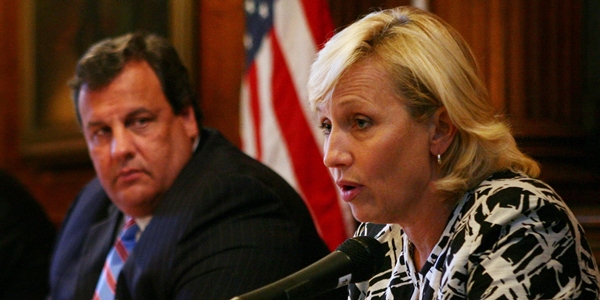Christie’s political comeback faces ‘Doublegate’ challenge

NOT TALKING: New Jersey Gov. Chris Christie refuses to talk about problems surrounding Lt. Gov. Kim Guadagno.
By Mark Lagerkvist | New Jersey Watchdog
As Gov. Chris Christie proclaimed his exoneration in the Bridgegate scandal, he refused to discuss his lieutenant governor, Kim Guadagno.
“This is my press conference, not hers,” snapped Christie. A reporter who attempted a follow-up question was quickly interrupted.
The internal investigation commissioned by the governor also cleared Guadagno of an allegation she threatened to withhold Superstorm Sandy relief funds from Hoboken unless its mayor supported a project proposed by a developer with ties to the Christie Administration.
Yet Guadagno may still be an Achilles Heel in Christie’s political revival and presidential ambitions.
Hoboken Mayor Dawn Zimmer’s accusation against Guadagno is difficult to prove or disprove. Guadagno and Zimmer were the only ones present during their private conversation and each has given a very different account of what transpired.
The big question is whether Guadagno can escape Doublegate — a lesser known controversy loaded with smoking gun documents.
The birth of Doublegate
Doublegate first surfaced in 2010 with an investigative report by New Jersey Watchdog detailing false and conflicting statements by Guadagno that enabled one of her top aides to improperly collect $227,000 in pension checks from the Police and Firemen’s Retirement System.
As Monmouth County sheriff in 2008 — the year before she was elected lieutenant governor — Guadagno hired Michael W. Donovan Jr. as “chief of law enforcement division” at an $87,500 annual salary.
Guadagno announced the appointment in a memo to her staff. The sheriff’s official website identified Donovan as “sheriff’s officer chief,” supervising 115 subordinate officers and 30 civilian employees.
Donovan faced a legal problem. He already was collecting an $85,000 a year state pension as a retired investigator for the county prosecutor. While double-dipping is often legal in New Jersey, this case was different.
Since the position of sheriff’s officer chief is covered by the pension system, Donovan should have been required to stop receiving pension benefits, re-enroll in the retirement plan and resume contributions to the pension fund.
Instead, Guadagno changed Donovan’s job title in several documents so her aide could be a double-dipper, collecting two sets of checks totaling $172,500 a year.
In county payroll records, the oath of office and a news release by Guadagno, Donovan was listed as the sheriff’s “chief warrant officer” — a similar sounding, but low-ranking position that’s not in the pension system. A chief warrant officer is responsible for serving warrants and other legal documents.
However, on Guadagno’s organizational chart, Donovan was listed as chief of law enforcement. The position of chief warrant officer was not on the chart.
While sheriff’s chief, Donovan pocketed $227,000 in checks from PFRS. Since he did not re-enroll in the pension plan, he avoided another $18,000 in contributions. If the state decides Donovan violated pension law, he could be forced to repay $245,000.
Guadagno could face a legal consequence for her role in the double-dipping scheme. Under state statute, “Any person who shall knowingly make any false statement or shall falsify or permit to be falsified any record or records of this retirement system…shall be guilty of a misdemeanor.”
Conflicted criminal investigation
The news reached state pension officials. The PFRS Board of Trustees voted in May 2011 to call for a criminal investigation of Donovan — plus similar cases involving John Dough, of Essex County, and Harold Gibson, of Union County.
The investigation immediately faced a major conflict-of-interest.
The case was assigned to the state attorney general’s Division of Criminal Justice, which Guadagno once supervised. She was DCJ’s deputy director from 1998 to 2001.
As Christie’s second-in-command, Guadagno serves on the governor’s cabinet as a colleague of the attorney general.
The governor has the authority to appoint an independent investigator under Article 5, Section IV, Paragraph 5 of the State Constitution. Instead, the Christie administration chose to let DCJ handle the probe.
The hush-hush investigation is regarded a state secret. Representatives of Christie, Guadagno and the attorney general’s office repeatedly have declined comment about the probe and its status.
Two months ago, PFRS trustees belatedly learned DCJ had closed the investigation in June 2012. However, DCJ did not tell the board what it found.
“If this is closed, when are we going to find out the outcome?” trustee John Sierchio asked at the February meeting. “I just want to know how they came to their conclusion.”
The records battle in court
The circumstances raise a troublesome question: Was the investigation a sham used by the Christie administration to bury the controversy rather than uncover the truth?
A New Jersey Watchdog reporter is fighting DCJ in Mercer County Superior Court as part of an effort to get access to records of the now-closed probe.
Over the state’s objections, Judge Mary C. Jacobson ordered the attorney general to submit a Vaughn index of its investigatory files for inspection by the reporter. While the parties argue over which documents, if any, must be released, the index remains sealed under a temporary protective order by the court.
In a parallel case, the reporter also is seeking records of the State Treasury’s internal inquiry into Donovan’s pension eligibility.
In February, Administrative Law Judge Linda M. Kassekert ordered the state Treasury to release 25 of 26 documents to the reporter under the state Open Public Records Act. Those files have yet to be released as the three-year-old case – which began as a complaint to the Government Records Council – continues to wind its way through the state’s administrative process.
Hearings in both cases are scheduled for later this month.
# # #
DISCLOSURE: Investigative reporter Mark Lagerkvist is the plaintiff in the public records cases against Treasury (OAL GRC 6985-13 & GRC 2011-110) and Division of Criminal Justice (Mercer County Superior Court, MER-L-464-13).







